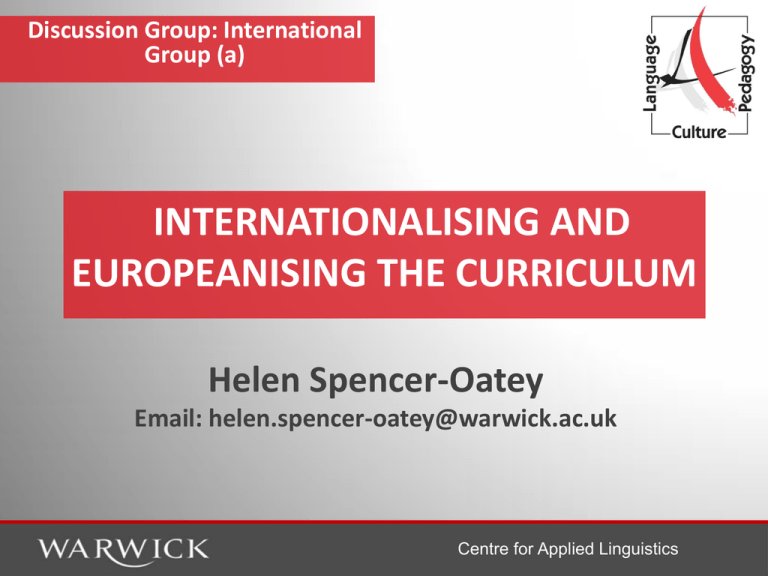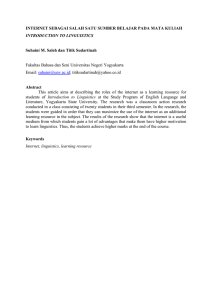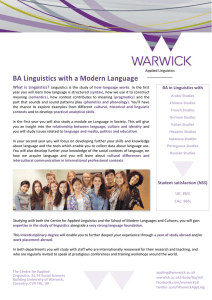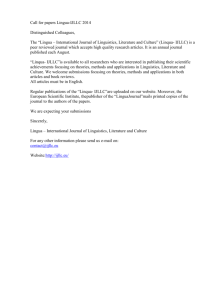INTERNATIONALISING AND EUROPEANISING THE CURRICULUM Helen Spencer-Oatey Email:
advertisement

Discussion Group: International Group (a) INTERNATIONALISING AND EUROPEANISING THE CURRICULUM Helen Spencer-Oatey Email: helen.spencer-oatey@warwick.ac.uk Centre for Applied Linguistics Overview • Introduction • Internationalisation of the curriculum • Europeanisation of the curriculum • Internationalisation Initiatives at Warwick • Q & A and Discussion Centre for Applied Linguistics Introduction Definitions and Scope • Curriculum: Taught curriculum + experiential elements that are accredited in some way • Whose curriculum? – Undergraduates – Postgraduate taught – Research students Centre for Applied Linguistics Internationalisation of the Curriculum: What are the issues? Centre for Applied Linguistics Internationalisation of the Curriculum Goals Assessment Mobility Content Curriculum Teaching Methods Staff Training Centre for Applied Linguistics Internationalisation of the Curriculum What are our Goals/Aims? “Enabling graduates to develop the appropriate knowledge, skills and values to be effective in a globalised world would seem to be a necessary component of being ‘world-class’, an aspiration of so many higher education institutions.” Bourn 2008:4 1. Intercultural Skills/competencies for engagement 2. Values: Global Citizens/Social Responsibility Bourn 2010; Jones & Killick 2007 Centre for Applied Linguistics Internationalisation of the Curriculum How should Curriculum Content be adjusted? • “Develop & monitor internationally relevant curricula for all courses.” McKinnon et al. 2000: 131 (Benchmark 10.5) What does this mean in practice? Centre for Applied Linguistics Internationalisation of the Curriculum How should Curriculum Content be adjusted? • “the curriculum can never be neutral, always legitimising some groups while marginalising others.” Cited by Caruana 2009: 9 • “some cultures are bound to be left out; some students are bound to be aggrieved. … interculturalism in teaching is not about covering multiple cultures, rather it is about working through a dialogue between cultures. … the focus should be on the dialogue itself rather than on the multiplicity of voices for the sake of inclusivity.” Lee 2005: 209, 201 • “diversity in and of itself is of little value unless we can enhance communication among diverse individuals and groups. To me this is the difference between a multicultural curriculum and an intercultural one.” Lee 2005: 202 Centre for Applied Linguistics Internationalisation of the Curriculum What adjustments to Teaching Methods should there be? • “Use international students as a resource in the teaching/learning environment, especially at PG level” McKinnon et al. 2000: 131 (Benchmark 10.2) • None?? • “teaching and learning strategies should, first and foremost, seek to challenge all students beyond their ‘comfort zone’ of knowing.” Caruana 2009: 10 Centre for Applied Linguistics Internationalisation of the Curriculum Do staff need training? • “Recent research (Caruana, 2010) with new academics at a UK university reveals that while espousing teaching and learning strategies which would enable students to challenge the cultural bias in knowledge construction within their own discipline and valuing qualities of criticality and empathy in the context of multiple perspectives, attempts to operationalise these strategies are dogged by feelings of uncertainty and lack of confidence.” Caruana 2009: 15 Centre for Applied Linguistics Internationalisation of the Curriculum How should staff be trained? • “25% of academic staff will have had recent research, teaching or practice supervision experience, with a duration of more than four weeks, in an overseas country within the last three years.” McKinnon et al. 2000: 131 (Benchmark 10.5) Centre for Applied Linguistics Internationalisation of the Curriculum How important is mobility? • “At least 5% of the completing UG cohort will undertake some component of their study abroad through such activity as exchange programs, work or clinical attachments and study tours. Around 3% of completing research students should undertake a component of their research abroad. Percentages should be increasing.” McKinnon et al. 2000: 131 (Benchmark 10.5) Centre for Applied Linguistics Internationalisation of the Curriculum How important is mobility? • “There has been an overemphasis on the role of fixed cultures in intercultural communication in stays abroad.” Dervin 2009: 119 • “Many researchers have demonstrated … that people who travel a lot or spend extensive time abroad are not necessarily more open-minded than others and sometimes they are even less.” Dervin 2009: 124 Centre for Applied Linguistics Internationalisation of the Curriculum How can we assess IC competence? • No agreed ‘ladder of IC competence’; BUT • Can identify relative strengths and weaknesses in different types of IC competence; • Ability and opportunity to critically reflect on experiences is vital. Centre for Applied Linguistics Internationalisation of the Curriculum Goals Assessment Mobility Content Curriculum Teaching Methods Staff Training Centre for Applied Linguistics Europeanisation of the Curriculum: Policy Recommendations Centre for Applied Linguistics Europeanisation of the Curriculum White Paper on Intercultural Dialogue Identifies 3 key competence areas for IC Dialogue: • Democratic citizenship • Language: “Language learning helps learners avoid stereotyping individuals, to develop curiosity and openness to otherness and to discover other cultures.” • History: “Knowledge of the past is essential to understand society as it is today and to prevent a repeat of history’s tragic events.” White Paper on Intercultural Dialogue, 2008 Centre for Applied Linguistics Europeanisation of the Curriculum EHEA: HE Priorities • social dimension: equitable access and completion, • lifelong learning; • employability; • student-centred learning and the teaching mission of higher education; • education, research and innovation; • mobility; • international openness; • data collection; • multidimensional transparency tools; • funding. Centre for Applied Linguistics Europeanisation of the Curriculum EHEA: Mobility Priority “We believe that mobility of students, early stage researchers and staff enhances the quality of programmes and excellence in research; it strengthens the academic and cultural internationalization of European higher education. Mobility is important for personal development and employability, it fosters respect for diversity and a capacity to deal with other cultures. It encourages linguistic pluralism, thus underpinning the multilingual tradition of the European Higher Education Area and it increases cooperation and competition between higher education institutions. Therefore, mobility shall be the hallmark of the European Higher Education Area. We call upon each country to increase mobility, to ensure its high quality and to diversify its types and scope. In 2020, at least 20% of those graduating in the European Higher Education Area should have had a study or training period abroad.” Leuven Communiqué (2009) Centre for Applied Linguistics Europeanisation of the Curriculum EHEA: International Openness “We call upon European higher education institutions to further internationalise their activities and to engage in global collaboration for sustainable development. The attractiveness and openness of European higher education will be highlighted by joint European actions. Competition on a global scale will be complemented by enhanced policy dialogue and cooperation based on partnership with other regions of the world, in particular through the organisation of Bologna Policy Fora, involving a variety of stakeholders.” Leuven Communiqué (2009) Centre for Applied Linguistics Internationalisation Initiatives at Warwick Centre for Applied Linguistics Curriculum Initiatives at Warwick • No university-level initiatives re content, teaching methods, assessment; • Some central provision of relevant staff development courses. Main foci: • conceptualisation of intercultural competencies • mobility Centre for Applied Linguistics Curriculum Initiatives at Warwick • How can we best conceptualise intercultural competencies? – Global People framework with authentic examples [intercultural partnerships] – Global Student framework See: http://www.globalpeople.org.uk Centre for Applied Linguistics Curriculum Initiatives at Warwick CONTEXT Transitions Participation Employability CLUSTERS Openness to New Ideas & Knowledge Communication Management of Relations Development of Personal Qualities Centre for Applied Linguistics Curriculum Initiatives at Warwick Current Initiatives • Online ‘mobility’ training materials designed around the competency framework, and with emphasis on reflection; • Research into the “Global Researcher” – Supervising/being supervised across cultural/language boundaries – Collecting & analysing data across cultural/language boundaries Centre for Applied Linguistics Any Questions or Reactions/Comments? Centre for Applied Linguistics Sample Discussion Questions 1. 2. 3. 4. 5. What does ‘Europeanisation’ of the curriculum mean to you? What benefits can it bring? What are the challenges and how can they be handled? Europe puts a lot of emphasis on language learning. How relevant is that to the UK? What examples/suggestions for good practice can you share? Centre for Applied Linguistics References Bergan, S. and van’t Land, H. (2010) Speaking across Borders: the role of Higher Education in Further Intercultural Dialogue. Strasbourg: Council of Europe Publishing. Bourn, D. (2008) Global Perspectives in Higher Education: The contribution of development education. Available at http://www.heacademy.ac.uk/resources/detail/events/annualconference /2008/Ann_conf_2008_Douglas_Bourn [accessed 28 January 2011] Bourn, D. (2010) Students as global citizens. In: E. Jones (ed.) Internationalisation and the Student Voice. London: Routledge, pp.18–29. Caruana, V. (2009) The internationalisation of UK higher education: from ‘technical observance’ to ‘relational participation’, the road to CAPRI. Enhancing Learning in the Social Sciences 2(1): 1–28. Caruana, V. (2010) The relevance of the internationalised curriculum to graduate capability: the role of new lecturers’ attitudes in shaping the ‘student voice’. In: E. Jones (ed.) Internationalisation and the Student Voice. London: Routledge, pp.30–43. Dervin, F. (2009) Transcending the culturalist impasse in stays abroad: helping mobile students to appreciate diverse diversities. Frontiers: The Interdisciplinary Journal of Study Abroad XXIV, pp.119-141. Available at http://www.frontiersjournal.com/backissues.htm [accessed 28 January 2011] Centre for Applied Linguistics References (contd.) Jones, E. and Killick, D. (2007) Internationalisation of the curriculum. In: E. Jones and S. Brown (eds.) Internationalising Higher Education. London: Routledge, pp.109–119. Lee, T.M.L. (2005) Intercultural teaching in higher education. Intercultural Education 16(3): 201–215. Leuven/Louvain-la-Neuve Communiqué (2009) The Bologna Process 2020 - The European Higher Education Area in the new decade Communiqué of the Conference of European Ministers Responsible for Higher Education, Leuven and Louvain-la-Neuve, 28-29 April 2009. Available at: http://www.ond.vlaanderen.be/hogeronderwijs/bologna/actionlines/index. htm [accessed 28 January 2011] Loon, T.T. and Dawson, J. (2003) Teaching and learning an internationalised curriculum. Available at: http://intercurriculum.curtin.edu.au/local/docs/Internationalisation%20Ti% 20%20paper.pdf [accessed 28 January 2011] McKinnon, K.R., Walker, S.H. and Davis, D. (2000) Benchmarking: A manual for Australian universities. Department of Education, Employment and Work Relations, Higher Education Division, Canberra. Section 10: Internationalisation. Available at http://www.dest.gov.au/sectors/higher_education/publications_resources/p rofiles/archives/benchmarking_a_manual_for_australian_universities.htm [accessed 28 January 2011] White Paper on Intercultural Dialogue (2009) Living together as equals in dignity. Strasbourg. Reprinted in S. Bergan and J-P. Restoueix (eds.) Intercultural Dialogue on Campus. Strasbourg: Council of Europe Publishing, pp.145–189. Centre for Applied Linguistics







